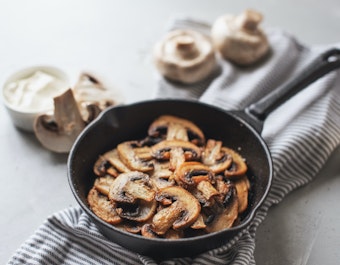Imagine you accidentally slice your thumb while chopping veggies or scrape your knee on an icy sidewalk. The injured area might stay red and swollen for a few days. That’s acute inflammation (the good kind!) hard at work, fighting off bacteria and healing an injury.
But there’s a second, chronic kind of inflammation that’s been linked to the development of serious health problems, like cancer and cardiovascular disease. Scientists aren’t exactly sure why yet, but some research suggests chronic inflammation harms how the immune system functions and also allows cancerous cells to grow more easily.
The good news? Chronic inflammation can be fought with some simple, daily habits. Here are six great places to start.
1. Prioritize Sleep
While you’re snoozing, your body is hard at work repairing itself — including regulating inflammation. A review of multiple studies found that people who experienced sleep disturbances and shorter sleep had higher levels of inflammation biomarkers, like C-reactive protein (CRP).
Think of it this way, says Temitayo Oyegbile-Chidi, MD, PhD, a sleep medicine doctor at UC Davis Health: All of the cells in your body have an internal clock (aka a circadian rhythm) that helps guide everything from when we feel tired to when we feel hungry. “If you’re not following the natural circadian pattern of these cells, they’re more likely to make mistakes that lead to cancer, autoimmune disease and other problems,” she says.
Pro Tips: To get better shut-eye, try sticking to a consistent sleep schedule. Keep your bedroom cool and dark. And try to avoid electronics at least an hour before bedtime. The blue light emitted by these devices may interfere with melatonin production, which can make it harder to fall asleep.
2. Get Moving
The benefits of exercise are nearly endless and, yep, fighting inflammation is one of them. A possible reason for that is that when your muscles contract, your immune cells secrete a cytokine that has anti-inflammatory properties, says Barb Nicklas, PhD, a professor of gerontology and geriatric medicine at the Wake Forest School of Medicine.
“People usually think of exercise frequency in terms of days per week,” Nicklas says. “But what’s more important is how frequently you move throughout the day.” One study found that replacing 30 minutes of sitting with light physical activity could even prolong your life.
Pro Tips: If blocking out a big chunk of time to exercise feels overwhelming, focus on small breaks throughout the day, says Nicklas. Set an hourly timer during work, so you remember to stand up and stretch, or try walking during conference calls. If you’re a TV fan, make it a habit to move during the commercial breaks, whether that means lunges around your living room or simple stretches. Moderate-intensity exercise can’t be beat, but even small bursts of movement throughout the day are worthwhile.
3. Manage Your Stress
Short-term stress can be helpful, like when the pressure of a big work deadline gives you a boost of energy to complete the project. But when you experience stress day in and day out, it can lead to chronic inflammation, says Susanna Galle, PhD, a Washington, DC-based integrative doctor who specializes in stress disorders. This kind of always-on stress causes your hypothalamic-pituitary-adrenal (HPA) axis to secrete hormones that suppress your immune system.
Pro Tips: “Stress less” is a lousy item to add to your to-do list. But it might seem less impossible if you shift the focus to managing your stress rather than vanquishing it completely, says Galle. Figuring out what works for you may take some trial and error. Maybe it’s weekly phone calls with a BFF or family member to talk through your big stressors, taking a walk during your lunch breaks, or adding a few minutes of meditation to your mornings. Talking with a therapist or doctor about how to best manage your stress can also do wonders, says Galle.
4. Quit Smoking
We all know that smoking cigarettes can cause all sorts of serious health issues, such as cancer, heart disease, and lung disease. What you might not realize is that smoking can also increase inflammation and make it harder for your cells to fight off pathogens.
Pro Tips: No matter how long you’ve been smoking, it’s never too late to stop. There’s also no one-size-fits-all approach that works for everyone. You might want to talk to your doctor about prescription medications or nicotine replacement therapies (like a lozenge or patch). You can also head to Smokefree.gov for free guidance and support, or check with your employer to see if they offer a smoking cessation program. The American Lung Association also offers nationwide clinics, and you can reach out to a certified tobacco treatment specialist at 800-LUNGUSA.
5. Watch Your Weight
Obesity is strongly linked to chronic inflammation, and research shows that having excess fat tissue promotes the secretion of biomarkers like CRP and increases chronic inflammation. The good news is that even modest weight loss can reduce those inflammatory biomarkers and lower your risk for cardiovascular diseases.
Pro Tips: The research is resounding that eating whole foods (with plenty of lean protein and fiber), keeping portion sizes in check, and being physically active can help you reach and maintain a healthy weight. But keep in mind that small improvements might be easier to sustain than aiming for overnight perfection says Ginger Hultin, a Seattle-based registered dietitian nutritionist at ChampagneNutrition. And you don’t have to go it alone. Consider joining a group or formal program for added support and guidance. Your work may even offer a free program to help you reach a healthy weight.
6. Upgrade Your Diet
No matter your weight, what you eat can impact how your body handles inflammation. Eating processed and red meat and high levels of added sugar have been linked to higher inflammation, while fruits, vegetables, legumes, whole grains, and spices like ginger and turmeric are associated with lower inflammation.
Pro Tips: You don’t have to swear off dessert and burgers for life. “We should move away from black and white thinking,” Hultin says. Instead, try to satisfy your sweet tooth with a modest amount of dark chocolate. Make red-meat meals a weekly rather than daily habit, or consider cutting back on red meat by bolstering dishes with more veggies (adding diced mushrooms to burger patties, for instance, or lentils and peppers to chili). Even a simple swap like replacing white pasta and white bread for whole-grain versions is a meaningful step in the right direction.






